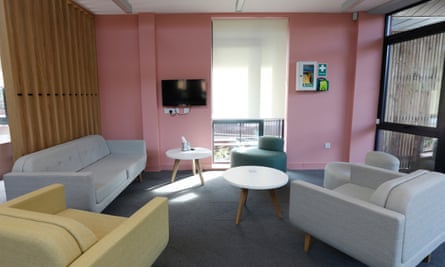Scotland’s pioneering community custody units – hailed as a UK first in supporting female inmates – have been left half-empty more than six months after they were opened, the Guardian can reveal.
Campaigners have been left frustrated by the costly, state-of-the-art units not being filled to capacity after opening last year as part of the Scottish Prison Service’s trauma-informed strategy for women.
At the Bella Centre in Dundee and the Lilias Centre in Glasgow, women live together in brightly furnished house units designed to promote independent living. Trained staff aim to gradually build confidence among a prison population that experiences extensive mental ill-health, while nearly half are flagged as potentially having a learning difficulty.
Figures seen by the Guardian confirm occupancy rates for both centres have never risen above 54% over the past six months. Most recent figures available for May show the Bella Centre at 50% and Lilias at 33% occupancy. In March, Bella slumped to 38% full while Lilias peaked at 54%.
At the time of opening, the Guardian was told prospective inmates would be assessed on their capacity to manage independent living and would be a mix of those on short sentences, who may serve most of their term in a community custody unit, and longer-term prisoners – including lifers – who are coming close to their parole date.
Responding to the occupancy figures, Katy Clark, the Scottish Labour community safety spokesperson, suggested the prison service needed to “urgently review” criteria for accessing the centres.
She said: “For those of us who have been campaigning for better facilities for women, it’s very concerning to hear that these facilities are not being used to capacity. They were very costly and took a long time to construct so the Scottish government owes us an explanation.”
Emma Jardine, the policy and public affairs adviser for the penal reform body Howard League Scotland, said: “It’s frustrating and disappointing that more women haven’t been able to access these, potentially transformative, facilities. The CCUs were designed in acknowledgment of the need for an environment which addresses trauma and adversity – so it could be argued that they are as much an investment in reducing reoffending, as they are a bald cost.
“However, if that cost is £16m and they’re not being used to their full potential, we need to keep asking why there are so few women being accommodated there, and whether the criteria for access to them is correct.”
When the units were first opened, campaigners said only two of the promised five centres had been built, seven years after they were first proposed in 2015 after the Scottish government shelved controversial plans for a women’s super-prison to replace the notorious Cornton Vale facility.
With Cornton Vale finally closed, and its new-build replacement Stirling opening soon, Jardine pointed to wider problems in accommodating female prisoners.

She said: “The Bella and Lilias Centres currently house only 5% of the women in custody in Scotland, which surely can’t have been what was envisaged by the Angiolini Report which advocated for them. Even when the new HMP Stirling becomes operational later this year, the figures just don’t add up: even if both CCUs and HMP Stirling are at 100% occupancy, there will still be approximately 60% of women held in other prisons across Scotland”.
A Scottish Prison Service spokesperson said: “Our new community custody units (CCUs), the Bella Centre, in Dundee, and Lilias Centre, in Glasgow, are the first facilities of their kind in the UK, and have an amplified focus on preparing those living there for successful reintegration into their communities.
“Individuals are considered for a transfer to the CCUs as part of the progression process, and must satisfy strict eligibility criteria and risk assessments in order to be housed there.
“To date, a total of 32 individuals have been accommodated in the CCUs. It should be noted that, given the units have been open for eight and six months respectively, time is required to test how they operate, and to ensure individuals meet the suitability requirements for progression.”

